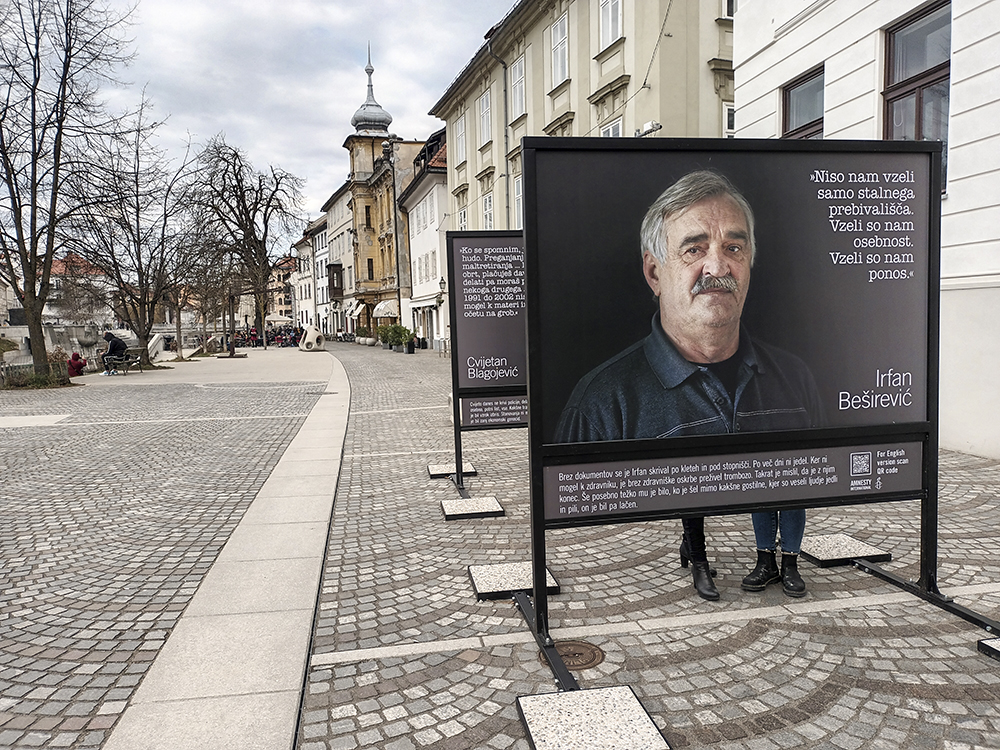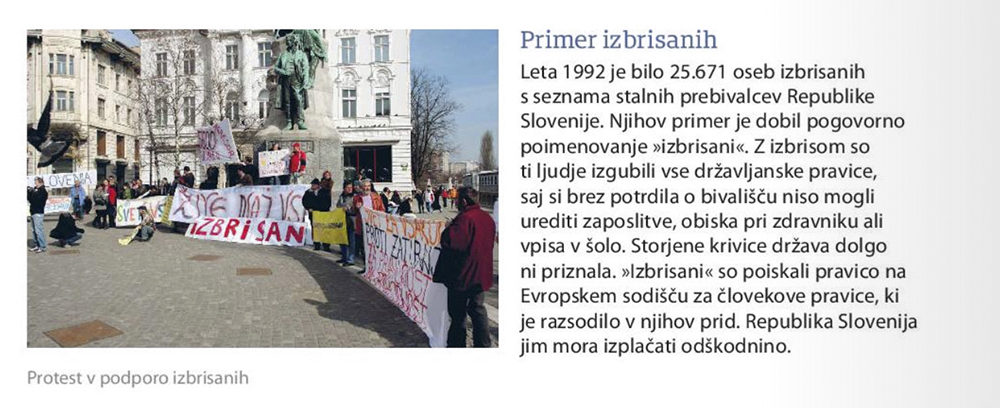Irfan Beširević is busy these days. “I am supervising a theater performance written by the late Slovenian producer and director Franci Slak,” he said, for an amateur performance marking “the 30th anniversary of the incident.” Beširević is a humble man, but deeply persistent. Behind him are long years of deprivation and stigmatization but also a loud and persistent fight.
A 64-year-old Slovene of Bosnian origins, Beširević was one of the approximately 26,000 people with permanent addresses in Slovenia who were erased from the register of residents in 1992. Almost all of them had links to parts of Yugoslavia outside of Slovenia.
“For many years these people thought they were fighting an individual fight not aware that there were thousands of them in the same position,” said Nataša Posel, the director of Slovenian Amnesty International.
Though this act of erasure has been declared illegal and unconstitutional by the Slovenian Constitutional Court, the Slovenian government has done little to make up for the damage it has caused to thousands of people.
Destroyed documents
In June 1991, as Yugoslavia seemed to be falling apart, Slovenia was the first republic to proclaim independence and start forming its own government.
During the time of Yugoslavia its citizens could move freely between the republics and had the option for permanent residency in all the republics. Then in 1991, the authorities of the newly independent Slovenia gave a period of six months for Yugoslav citizens of non-Slovene background who were resident in Slovenia to apply for residency in the new state.
But few knew about this requirement, and those who did know were often unaware of the consequences of not applying. As a result, Serbs, Croats, Bosniaks, Albanians, and other people with roots in Yugoslavia outside of Slovenia, but who may have been living in Slovenia for decades or even born there, were excluded.
On February 26, 1992 the Slovenian administration erased, without warning and without option to appeal, the names of everyone on the register of permanent residence who hadn’t registered in the six month period, which included 5,360 children.
In addition, the top officials of the first Slovenian government, under the right-wing nationalist party Demos and the supervision of Prime Minister Lojze Peterle, Interior Minister Igor Bavčar and State Secretary Slavko Debelak, instructed administrative workers to start destroying the personal documents of people like Beširević. “I came to the unit in Ljubljana and at the desk they simply punched [a hole in] my ID. I effectively became a citizen without documents,” Beširević recalled.
He was shocked. He had missed the six month period because he was in the hospital after a serious accident. In a moment he became stateless, losing his rights to medical care, travel or even opening a bank account. He spent the next ten years, when he finally received citizenship, fearing deportation.

A public exhibit shows the stories of the erased in Ljubljana, Slovenia. Photo: Katja Lihtenvalner.
The case of the erased, as they are referred to, is considered one of the biggest violations of human rights in Slovenian history, though it did not affect all foreigners equally.
“Foreigners from other countries like Italy, Austria or other countries could easily retain their residence, but not the ones from the Yugoslav countries,” Posel said. The Slovenian Peace Institute refers to this administrative act of erasure as a “case of blatant discrimination” on the basis of ethnicity.
Those who were erased had to reapply for permanent or temporary residence, but to do so they needed an identity document from the place where they had been entered in the local register during the Yugoslav period, which often meant needing administrative documents from active warzones. In practice, this meant that they were left without civil rights, trapped in a Slovenia that was until recently their legal residence but from which they could now be expelled at any moment.
“For years, we have called for an independent investigation to find out what actually happened,” Posel said, explaining that people were pushed into a corner, isolated and fearful. According to her, no one knows how many people were deported and the numbers cited by officials are doubtful. Many were expelled, or refused re-entry or have simply been living in silence without documents, now for decades.
“Many of them for years didn’t admit even to their closest friends that they don’t have personal documents,” she said.
Stateless and then homeless
The stories of thousands of erased people came to the surface in early 2000 after many had already been deported to former Yugoslav countries or had been pushed into an onerous administrative struggle to try to regain residency in Slovenia. “Among other things, they demanded from me a document of non-criminal activities in Bosnia, even though I never lived there,” the once stateless man Beširević said.
Deprived of his legal rights, Beširević was forced into poverty, he became homeless and severely ill.
“Citizenship was not an issue for most of us. We just wanted permanent residence and all the rights that belong to it, so we can continue raising our families, work and live normally as we did before,” he said.
Though fluent in Slovenian — it is his first language — Beširević was obligated to take a Slovenian language exam. Though he is able to forgive the workers who were implementing these orders, “politicians we will never forgive,” he said.
Beširević received his citizenship in 2003, but social stigma targeting the erased people didn’t stop. Especially after 2000 when the issue gained more public notice, insults and slurs, directed at times from political elites, picked up.
“I was called an erased čefur on many occasions,” Beširević said, referring to a derogatory term used in Slovenia for people who come from other parts of former Yugoslavia.
At the same time the erased people started to mobilize and talk openly about their situation.
In 2004 there was a referendum in which citizens were asked whether the state should restore the civil rights of the erased people. The majority voted against. The Constitutional Court eventually rejected the results of the referendum in 2010.
“The media and political campaign against the erased citizens was extremely harmful, they were accused of being state enemies,” Posel said.
Trapped in an administrative nightmare, many of the erased people lost what should have been the best years of their lives.
The erased suffered difficult economic conditions for years in the newly established and increasingly prosperous Slovenia. In some families of erased people the children, being the only members of the family with legal status, had to work to help the family survive.
Beširević now lives off 320 euros per month, extremely low for Slovenian standards. Because of his weak health he is not able to work. He shares an apartment with flatmates and hopes for his pension to come soon.
“I hope in one year I can become a pensioner, but I have no hopes that my financial compensation will be much higher from what I am receiving today,” he said.
Trapped in an administrative nightmare, many of the erased people lost what should have been the best years of their lives.
Sara Pistotnik, a field researcher for the Slovenian Peace Institute, noted in a recent article that the purpose of European migration policies, including those of Slovenia, were often not deportation but rather the threat of deportation, a strategy that pushed individuals to live in fear and under constant psychological pressure.
“Thirty years after its establishment, the administrative apparatus of the Slovenian citizenship system is still functioning in a similar way, but it is adapting to new groups of non-citizens who wish to live in Slovenia, but for various reasons are considered undesirable or unwanted,” Pistotnik writes.
Time for apologies
Even though the illegality of the act of erasure has been confirmed by both the Slovenian Constitutional Court and the European Court of Human Rights, the damage to these people’s lives has never been repaired.
The country started to address the issue of compensation after the European Court of Human Rights ruled in 2012 that the Slovenian authorities had failed to uphold their legal requirements towards the erased. The state adopted a compensation scheme at the end of 2013, stipulating that for each month of erasure, a sum of 50 euros would be paid to those affected.
While a number of high level government officials have apologized to the erased, an official state apology didn’t arrive until 30 years after the event, on February 25, 2022.
President Borut Pahor read out the statement in front of a crowd: “Dear erased, please accept my sincere apologies on my behalf and on behalf of the state for the unconstitutional act of erasure from the permanent residence register, for the violation of your human rights and for all the injustice and suffering that this act has caused you and your families.”
Beširević, who was invited to the Presidential Palace for the occasion along with a few others, expressed his satisfaction with Pahor’s move, describing it as a “moral victory for the erased.”

According to Posel, this paragraph is the sole mention in the school curriculum of one of the most major human rights violations committed by the Slovenian state. Photo: Katja Lihtenvalner.
Together with the theatrical performance supervised by Beširević at the occasion of the anniversary, Amnesty International organized photo exhibitions dedicated to the erased, while a new book recently arrived on bookstore shelves titled “I am here. The stories we don’t want to hear,” featuring the stories of two erased people.
“I have the feeling that the voice of the erased has died. After years of struggle, when the erased achieved many victories, there has been a kind of silence in recent years that urgently needs to be broken,” said Andraž Rožman, one of the book’s co-authors.
Posel agrees that the issue has been largely forgotten. She shows as evidence what she presents as the sole mention of the issue in the Slovenian educational curriculum, a short paragraph in a seventh grade schoolbook.
While the issue gained extensive local media attention on the 30th anniversary of the erasure, activists for the erased say their fight is not over.
“The topic of the erased must be included in textbooks. We want students to be able to learn about this topic,” said Beširević.
After our interview Irfan Beširević slowly buttoned up his coat, said goodbye and picked up his red bike. His movements are slow, his body is tired. Beširević’s life would have been very different if he had acted in those six months in 1991 when others decided his faith and proclaimed him an erased citizen.
Feature image: Katja Lihtenvalner.


This article has been produced with the financial support of the “Balkan Trust for Democracy,” a project of the German Marshall Fund of the United States and the Norwegian Ministry of Foreign Affairs. Opinions expressed in this article do not necessarily represent those of the Norwegian Ministry of Foreign Affairs, the Balkan Trust for Democracy, the German Marshall Fund of the United States, or its partners.
Why do I see this disclaimer?




